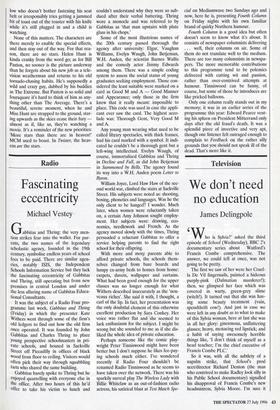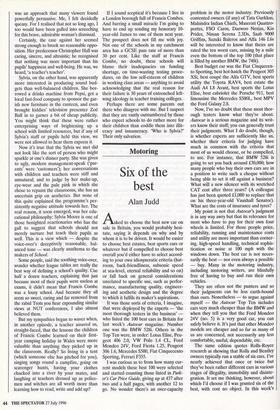Television
We don't need no education
James Delingpole
`Who is Sylvia?' asked the third episode of School (Wednesday), BBC 2's documentary series about Watford's Francis Combe • comprehensive. The answer, we could tell at once, was not going to be pretty.
The first we saw of her were her Cruel- la De Vil fingernails, painted a hideous purply-pink (Dalmatian murderer!); then, we glimpsed her face which was covered in warty, green-grey slime (witch!). It turned out that she was hav- ing some beauty treatment (vain, spendthrift cow!). And just in case we were left in any doubt as to what to make of this Sylvia woman, here at last she was in all her glory: ginormous, unflattering glasses; heavy, menacing red lipstick; and a habit of saying awesomely horrible things like, 'I don't think of myself as a head teacher; I'm the chief executive of Francis Combe PLC.'
So it was, with all the subtlety of a napalm strike, that School's prod ucer/director Richard Denton (the man who contrived to make Radley look silly in his Public School documentary) signalled his disapproval of Francis Combe's new headmistress, Sylvia Moore. I'm sure it
was an approach that many viewers found powerfully persuasive. Me, I felt decidedly queasy. For I realised that not so long ago, I too would have been gulled into screeching for this brave, admirable woman's dismissal.
Certainly, the case against her seemed strong enough to brook no reasonable oppo- sition. Her predecessor Christopher Hall was caring, sincere, and altruistic; he recognised that nothing was more important than his pupils' happiness and well-being. He was, we heard, 'a teacher's teacher'.
Sylvia, on the other hand, was apparently more interested in producing sound bud- gets than well-balanced children. She bor- rowed a drinks machine from Pepsi, got a local fast-food company to sponsor the gar- ish new furniture in the canteen, and even brought kiddies' television presenter Zoe Ball in to garner a bit of cheap publicity. You might think that these were rather enterprising ways of brightening up a school with limited resources, but if any of Sylvia's staff or pupils held this view, we were not allowed to hear them express it.
Now it's true that the Sylvia we met did not look like the sort of person who might sparkle at one's dinner party. She was given to ugly, modern management-speak ('par- ents' were 'customers'); her conversations with children and teachers were stiff and unnatural; and to judge by her make-up, eye-wear and the pale pink in which she chose to repaint the classrooms, she has an uncertain grip on aesthetics. But none of this quite explained the programme's per- sistently negative attitude towards her. The real reason, it soon emerged, was her edu- cational philosophy: Sylvia Moore is one of those benighted reactionaries who has the gall to suggest that schools should not merely nurture but teach their pupils as well. This is a view which — despite the voice-over's deceptively reasonable, bal- anced tone — was clearly anathema to the makers of School.
Some people, said the soothing voice-over, wonder whether league tables are really the best way of defining a school's quality. Cue half a dozen teachers, explaining that just because most of their pupils were useless at exams, it didn't mean that Francis Combe was a lousy school. And because they all seem so sweet, caring and far removed from the rabid Trots you hear expounding similar views at NUT conferences, I also almost believed them.
But my sympathies began to waver when, in another episode, a teacher assured us, straight-faced, that the lessons the children of Francis Combe learned on their first- year camping holiday in Wales were more valuable than anything they picked up in the classroom. Really? So living in a tent (which someone else has pitched for you), singing songs round a campfire, going on scavenger hunts, having your clothes chucked into a river by your mates, and laughing at teachers dressed up as police- men and witches are all worth more than learning how to read, write and add up? If I sound sceptical it's because I live in a London borough full of Francis Combes. And barring a small miracle I'm going to have to end up sending my honorary 10- year-old James to one of them next year. The prospect does not fill me with joy. Not one of the schools in my catchment area has a GCSE pass rate of more than 30 per cent. Like the staff at Francis Combe, no doubt, these schools will blame their inadequacies on funding shortage, on time-wasting testing proce- dures, on the low self-esteem of children in working class areas — anything to avoid acknowledging that the real reason for their failure is 30 years of entrenched left- wing ideology in teacher training colleges. Perhaps there are some parents out there who disagree with me. But I suspect that they are vastly outnumbered by those who expect schools to do rather more for their children than coddle them into illit- eracy and innumeracy. 'Who is Sylvia?' Their only salvation.



























































 Previous page
Previous page